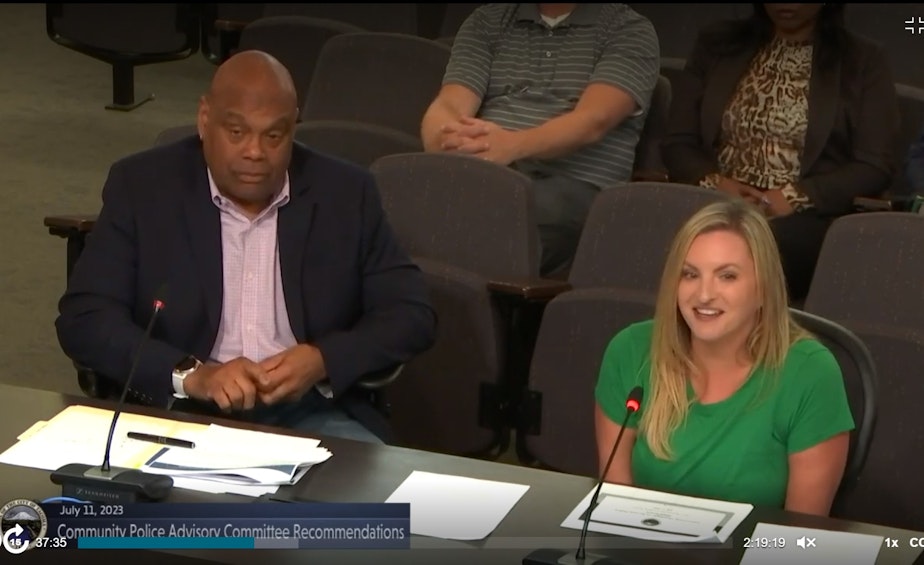In Tacoma, some volunteers chafe at 'toothless' police oversight role

It’s a pivotal moment for policing in Tacoma, with the departure of three officers acquitted of criminal charges in the death of Manuel Ellis. Tacoma officials say they’ve negotiated a contract with the police union that gives the city important new powers when handling future misconduct allegations.
But some community members say the new contract has sidelined their goals for greater transparency by the Tacoma Police Department.
Tacoma’s Community’s Police Advisory Committee is all volunteers, tasked with making recommendations on police department policies. Two current members spoke with KUOW on their own behalf, not for the committee as a whole.
Louis P. Cooper Jr. joined the committee seven years ago.
“I don’t want to paint all police officers in the same box,” Cooper Jr. said. “But the bottom line is as a Black man in America I needed to be part of this to help make change in the community.”
But the committee’s role and resources fall far short of the civilian oversight structures in Seattle, for example. It has no dedicated staff, and isn’t informed about internal police department complaints, only those filed by members of the public.
“I quickly realized when I got on the committee that the committee had very little power to make changes,” Cooper Jr. said.
In the wake of Ellis’ in-custody death and racial justice protests in 2020, committee members sought to transform the group’s role. After seeking feedback from the public and experts, including an evaluation by 21 CP Solutions that found an unusually low level of sustained complaints in Tacoma, the committee asked Tacoma officials for the ability to review the quality of internal investigations.
Allen McKenzie, who chairs the committee, said he’s spent his own money on public disclosure requests to obtain body camera footage and other police records. McKenzie said the committee wants to see all misconduct complaints and have an opportunity to voice concerns before cases are closed.
“We never asked for power to be final decider of discipline,” he said. “All we asked for was to have a say, to be able to tell the chief what we think, and have him take that into consideration as he makes his decision.”
Last July, Cooper Jr. and former advisory committee member Shayna Raphael presented their recommendations to the Tacoma City Council. Tacoma City Manager Elizabeth Pauli advised the council that “depending on whether we are looking at all or part of the recommendations, we have different labor implications and obligations.”
But ultimately none of their proposals were included in the new police contract. Instead, the city manager said her office will hire someone to review police department complaints.
Community's Police Advisory Committee members said that new staff person will not have enough independence . Raphael called that outcome “quite the slap in the face and a real lack of transparency with us.”
Victoria Woodards is the member of the Tacoma City Council who presides as mayor. She said the new police contract “creates meaningful and fundamental change.” One change requires the chief of police to place an officer on leave without pay when facing serious criminal charges. The new contract also allows the agency to investigate and potentially discipline an officer before any criminal trial occurs.
Woodards said it may be possible to negotiate further changes to civilian oversight with the police union alongside the new contract. And she regards the new staff position as a step forward.
“We continue to make movement, this is not the end,” she said. “And while it may not be perfect, I want to remind us to not to let perfect get in the way of good. We are making progress.”
Tacoma Police Chief Avery Moore said questions about proposed changes to the advisory committee should be referred to the city manager. But he said in the committee’s current role, “we’re in the process of rewriting our policies so we forward them to CPAC and get their recommendations, and that’s worked well.”
Moore said he’s in support of the new staff position if that role can enhance public trust of the Tacoma Police Department.
“If it’s a way we can continue to build a good relationship and gain trust from the community, if that’s the goal, then we would be amenable to that,” he said. “Because our goal is to create trust where we don’t have it, and to really have a good relationship with the entire community of Tacoma.”
Moore noted that the department also involves members of the public during the interview process to hire new officers, and during investigations of police shootings.
Bishop Lawrence White, who heads the Tacoma Ministerial Alliance, supports more oversight power for the advisory committee, but said he does have faith in the police chief to make improvements in Tacoma.
White said the city urgently needs to repair trust between community members and the police union.
“I just think it’s high time for that gap to be closed, that it’s more of a collaborative effort of policing and accountability, and not just them as an entity being allowed to protect themselves," he said.
The union did not respond to a request for comment. It issued a statement on Jan. 16 saying the officers charged in Ellis’ death were subjected to a “political witch hunt.” The U.S. Attorney’s office in Seattle said it is reviewing the failed criminal case against the police officers. White said he hopes the U.S. Justice Department will take some form of action in the case.

